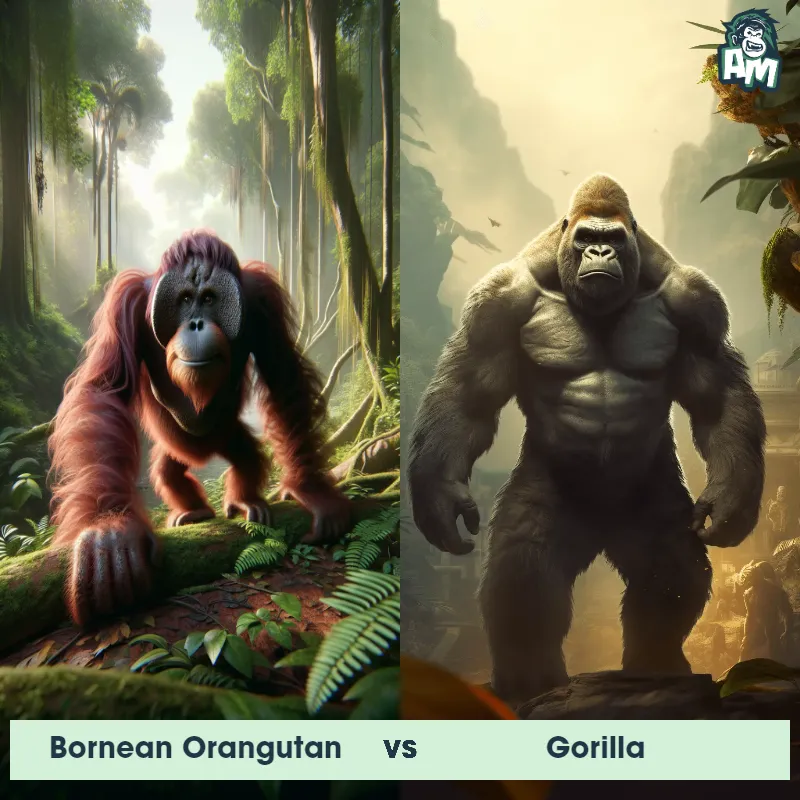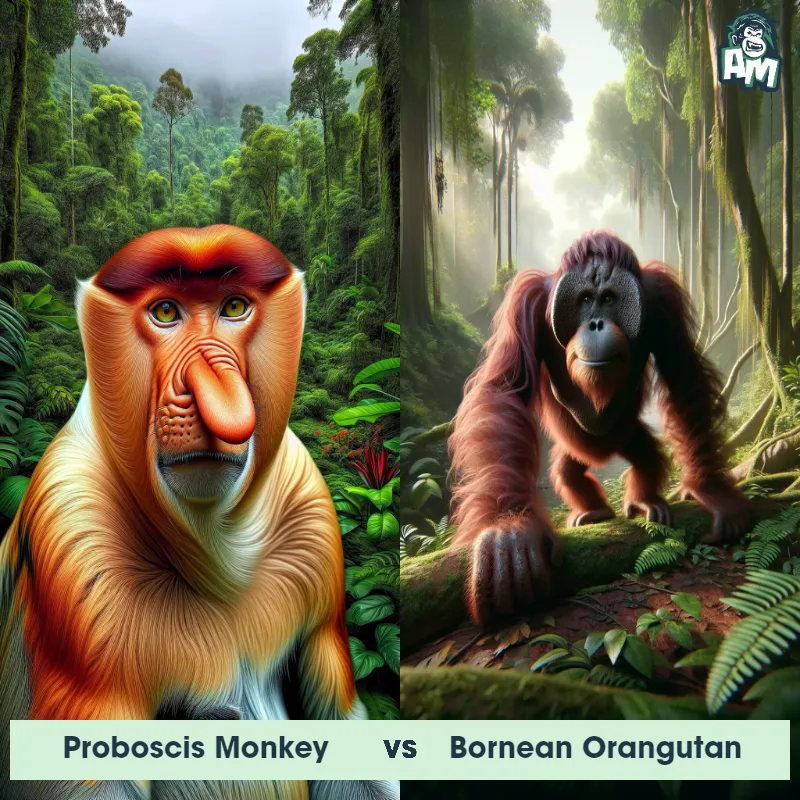The Bornean Orangutan
The Bornean Orangutan, also known as Pongo pygmaeus, is a large primate species native to the island of Borneo in Southeast Asia. These orangutans are known for their distinctive reddish-brown fur, which covers their bodies except for their face, hands, and feet. They are arboreal creatures, spending most of their time in trees, where their long arms and strong hands help them navigate the forest canopy. Bornean Orangutans are highly intelligent and are known to use tools, such as branches, to extract food. They are also solitary animals, with males having large cheek pads called flanges, a distinct trait among orangutans.

| Bornean Orangutan | |
|---|---|
| Size | Up to 5 feet tall (1.5 meters) |
| Weight | Up to 200 pounds (90 kilograms) |
| Speed | 3.7mph (6km/h) |
| Key Strength | Strong arms for climbing and swinging |
| Biggest Weakness | Lack of specialized weapons or defensive features |
| Scientific Name | Pongo pygmaeus |
| Family | Hominidae |
| Habitat | Rainforests |
| Geography | Borneo, Southeast Asia |
| Diet | Omnivorous, primarily fruit, leaves, and bark |
| Lifespan | 30 years - 40 years |

The Bornean Orangutan
The Bornean Orangutan, also known as Pongo pygmaeus, is a large primate species native to the island of Borneo in Southeast Asia. These orangutans are known for their distinctive reddish-brown fur, which covers their bodies except for their face, hands, and feet. They are arboreal creatures, spending most of their time in trees, where their long arms and strong hands help them navigate the forest canopy. Bornean Orangutans are highly intelligent and are known to use tools, such as branches, to extract food. They are also solitary animals, with males having large cheek pads called flanges, a distinct trait among orangutans.
Fun Fact: One fun fact about the Bornean Orangutan is that they are the largest arboreal mammals on Earth, with adult males reaching heights of around 5 to 5.9 feet 1.5 to 1.8 meters when standing fully upright!
| Bornean Orangutan | |
|---|---|
| Size | Up to 5 feet tall (1.5 meters) |
| Weight | Up to 200 pounds (90 kilograms) |
| Speed | 3.7mph (6km/h) |
| Key Strength | Strong arms for climbing and swinging |
| Biggest Weakness | Lack of specialized weapons or defensive features |
| Scientific Name | Pongo pygmaeus |
| Family | Hominidae |
| Habitat | Rainforests |
| Geography | Borneo, Southeast Asia |
| Diet | Omnivorous, primarily fruit, leaves, and bark |
| Lifespan | 30 years - 40 years |
Bornean Orangutan Matchups
We use AI to simulate matchups between the Bornean Orangutan and other animals. Our simulation considers size, strength, and natural predatory behaviors to determine the most likely outcome.

Can't find the Matchup you want?
Create Your Own MatchupBornean Orangutan: Diet, Predators, Aggression, and Defensive Behaviors
What do Bornean Orangutans eat?
Bornean Orangutans are primarily frugivores, meaning they mainly consume fruits such as figs and durians. However, they also supplement their diet with leaves, bark, insects, and occasionally small vertebrates like birds and lizards.
Do Bornean Orangutans have any predators?
Bornean Orangutans do not have many natural predators in the wild due to their large size and strength. However, they may sometimes fall prey to large predators such as clouded leopards and pythons.
Are Bornean Orangutans aggressive?
Bornean Orangutans are generally solitary and peaceful animals, but they can become aggressive when provoked or threatened. Males, in particular, may exhibit aggression towards other males during mating season to establish dominance.
Do Bornean Orangutans fight?
Bornean Orangutans are not known for engaging in physical fights often, as they typically try to avoid confrontation. However, males may fight for dominance or mating rights, using their strength and long arms to intimidate rivals.
How do Bornean Orangutans defend themselves?
Bornean Orangutans rely on their powerful jaws, sharp teeth, and long, muscular arms to defend themselves from predators or other threats. They may also vocalize loudly or retreat to the treetops to evade danger.
What is the biggest weakness of Bornean Orangutans in a fight?
Despite their strength and impressive physical abilities, Bornean Orangutans' biggest weakness in a fight is their relatively slow movement on the ground. They are better suited for navigating trees than running on the forest floor, making them vulnerable to faster predators or threats.
Fun Fact: Another fascinating fact about the Bornean Orangutan is that they have incredible strength, capable of lifting up to 30 times their own body weight, which is equivalent to a human lifting a small car!
Fun Fact: In addition to their strength, Bornean Orangutans are excellent climbers and can move through trees at a speed of up to 10 miles 16 kilometers per hour, leaping effortlessly from branch to branch.












